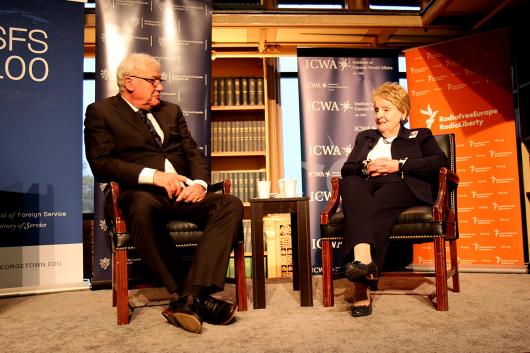
Remembering and Reflecting on the Velvet Revolution
12.11.2019 / 21:00 | Aktualizováno: 21.11.2019 / 23:29
The Czech Embassy and the Slovak Embassy in collaboration with Georgetown University commemorated the 30th anniversary of the Velvet Revolution via a panel discussion and conversation with former United States Secretary of State Madeleine Albright.
On November 12, 2019, the Czech Embassy and the Slovak Embassy organized the prestigious panel discussion Velvet Revolution @30: A Legacy to Uphold at Georgetown University to remember and reflect on the Velvet Revolution, which brought freedom and democracy back to Czechoslovakia in 1989. Distinguished panelists, which included those who courageously led the way during the demonstrations and those who continue to lead the society into the years to come, shared their memories and experiences of the movement, which propelled Central Europe into the next century.
Dean of the Walsh School of Foreign Service, Joel Hellman, opened the panel discussion held inside the Riggs Library, noting that it fittingly coincides with the centennial anniversary of the establishment of Georgetown University’s Walsh School of Foreign Service. Ambassador of the Czech Republic Hynek Kmoníček offered his opening remarks, stating that the events which took place thirty years ago still continue “to divide Czech society” with many questions such as “what was the role of the US” and “was it really a revolution?” Ambassador of the Slovak Republic Ivan Korčok then emphasized the importance of the role of students in triggering the events thirty years ago and stressing that “the struggle for democracy never ends.”
Next, former United States Secretary of State Madeleine Albright held a conversation with former Ambassador of the Czech Republic to the US Martin Palouš. Secretary Albright began by saying that she was the “daughter of Czechoslovakia” as her family immigrated to the US in 1948 and how her life came full circle when she helped late dissident turned Czechoslovak President Václav Havel establish a presidential office. Sharing first-hand memories, Albright and Palouš both reminisced on the tense yet exciting times thirty years ago, the fall of communism, and the reinstatement of a democratic system, respectful of human rights.
Secretary Albright further spoke about the wisdom of President Havel’s famous speech in 1990 before a joint session of the US Congress, in which Havel asked for help for the Soviet Union “on its irreversible but immensely complicated road to democracy.” She also noted that she organized his visit to Georgetown University to meet students during that trip. Secretary Albright went on to discuss the world today, underlining that “democracy is hard” and that the next ‘Berlin Wall’ is the “wall of disinformation.”
The first panel discussion, moderated by Gregory Feifer, Executive Director of the Institute of Current World Affairs in Washington, focused on My November 1989: Testimony on How the Velvet Revolution Changed Our World. Šimon Pánek, who was a student leader during the Velvet Revolution and is now the Executive Director of the non-profit organization People in Need, remembered how students “wanted to get rid of communism so they could stop listening to lies” and how the brutal police response to their protest ignited an awakening in the Czechoslovak society. He emphasized how the revolution fortunately and quickly turned into a negotiation. Still, he acknowledged that “with freedom comes responsibility” and he hopes that Czechs will give back by helping others.
Martin Bútora, co-founder of Public Against Violence and former Ambassador of the Slovak Republic to the US, recalled that “no one wanted to be a leader but someone had to do it.” He said that there was an “atmosphere of solidarity,” which broke the “spell of fear.” Still, he recognizes that “democracy is a process.”
Angela Stent, Director of the Center for Eurasian, Russian and East European Studies and Professor of Government and Foreign Service at Georgetown University, shared her memories of being at Georgetown University when President Havel fist visited, saying that his message was “you can be an activist and make a change.” She revealed that she often sits at Václav Havel’s Place in the Alumni Square at Georgetown University as it is a “place of contemplation” in this polarized world of today. She credits the Velvet Revolution as being a “triumph of people who were fighting for democracy and they were able to do it peacefully.”
The second panel discussion on the Fight for Freedom Never Ends: Velvet Revolution’s Legacy for Today and Tomorrow was led by František Šebej, former Chairman of the Foreign Relations Committee of the National Council of the Slovak Republic. He stated that thirty years later he still cherishes his “freedom to move,” to be able to walk across the border from Slovakia to Austria. He then spoke highly of his successor, Katarína Cséfalvayová, who is now the Chairwoman of the Foreign Relations Committee of the National Council of the Slovak Republic. Chairwoman Cséfalvayová, who represents the younger generation, said that the youth is “not learning enough about that time” three decades ago. She warned about the dangers from the extreme left and emphasized that freedom and democracy is achieved through international cooperation.
Jamie Fly, the President of Radio Free Europe/Radio Liberty, also talked about the “corrosion of truth” and disinformation being the ‘new wall.’ He noted that President Havel thought that Radio Free Europe’s broadcasting would be needed in less countries after the Velvet Revolution but that is not the case in today’s world. He stated that Radio Free Europe, which strives to offer a neutral platform for news, is expanding to more countries needing independent media.
Lastly, Václav Bartuška, former student leader during the Velvet Revolution and current Ambassador-at-Large for Energy Security of the Czech Republic, gave his perspective on forgiving but not forgetting. He stressed that “a revolution isn’t over in a day or two.” He spoke about the hard transition period thereafter but ended with “we have a lot to celebrate; we are the lucky ones.”
















